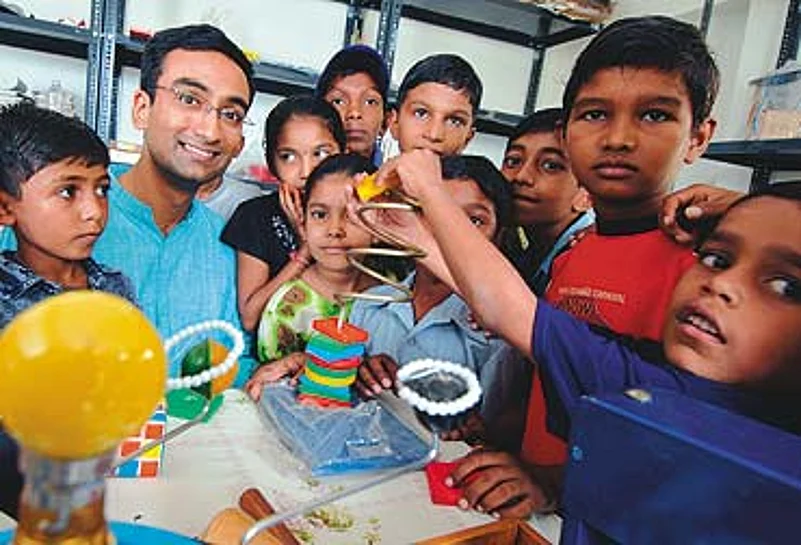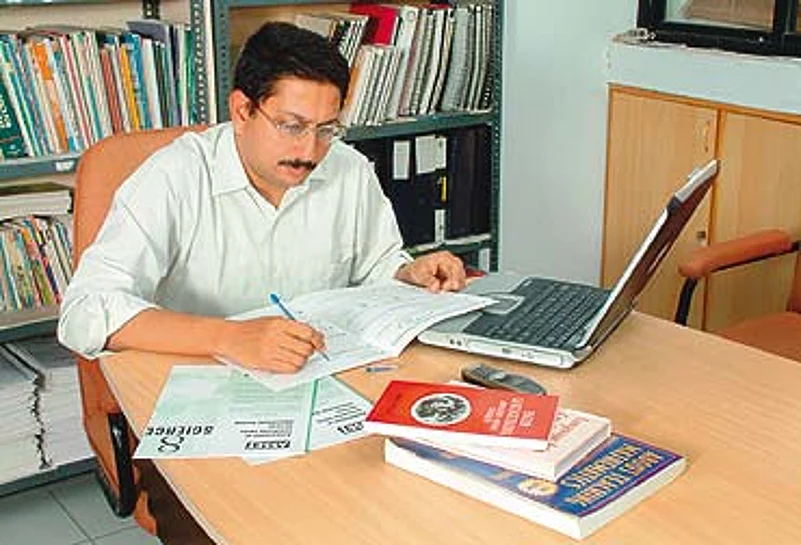
And in Chennai, Balaji Sampath, an IIT graduate with a doctorate in electrical engineering from the US, who runs AID India, an NGO that carries out science teaching and primary school programmes in 350 government schools in Tamil Nadu, finds other engineers are keen to join his project. Starting out as volunteers, hardware engineer Chandra Anil, 32; software engineer Smita Kalyani, 25; and Ravi Shankar, 31, an ex-IITian with a doctorate in computer and electronic engineering and who once worked for IBM in the US, now work with him full-time.
The point of these examples is that a significant number of 'techies' and 'corporate types', many with blue-chip names on their CVs, are going down this road—not at retirement age, but during their most productive professional years. For most, there are financial costs involved—from the risks inherent in a new venture to taking a salary cut. Even if large NGOs like Pratham pay their top staff Rs 60,000 per month, it is still a fraction of what their corporate counterparts earn. Smaller NGOs, like AID India, pay far less.
It's not an entirely new phenomenon; education has always had drawing power for "outsiders"—in the '70s, there were the physicists, engineers and others who came together under the banner of education NGO Eklavya. Madhav Chavan, one of Pratham's founders, was a chemistry professor until the mid-'80s. IIT andMIT-trained engineer Lalit Pande also turned to education in the mid-'80s.
But remarkable though these actions were, it was also a different time. Engineering and management colleges were not 'brands', parents weren't blowing up their savings on coaching classes, MBAs weren't being wooed with seven-figure starting salaries, and people who worked in the social sector were not dismissed as "jholawalas". Today, it's perhaps even more at odds with an increasingly right-wing public culture for bright, ambitious, young people to want to spend their working lives on giving 200 million shortchanged Indian schoolchildren a better educational deal.
So, why are they doing it? This is social commitment defined by a strong dash of individualism. "A sense of adventure, and a desire for recognition, the need to be something more than a small fish in a corporate pond," says Rukmini Banerji of Pratham, herself a PhD in economics. "These are also people wanting to make an impact, to use their skills to improve what they see around them."

Sridhar Rajagopalan: BTech from IIT-Madras, MBA from IIM-A, worked for Tata IBM. Now tests learning outcomes among schoolchildren.
They are also, often, people who have nursed ambitions to work "in development" while reflexively sitting for exams, and then measuring out their lives in software projects or corporate targets, to meet the expectations of middle-class families. Or professionals chafing at the rigid structures of corporate life. In six months, says Joshi, he has been coining slogans, sticking posters on walls, liasing with government, meeting teachers and principals, interacting with cutting-edge educators—a range of activities that did not come his way before. "You have a freedom to experiment—and a chance to learn by failing."
Says Gurumurthy Kasinathan, 38, who worked for consultancy giant A.F. Ferguson and software company i-Flex Solutions before moving to the Azim Premji Foundation (APF), which has deputed him to help the Karnataka education department revamp its programmes, "A staff of two lakh, 32 districts, 202 blocks, 2,200 villages, 45,000 schools. No corporate job can give you this size, this scale, this complexity and these multiple levels of expectations."
But why education? "With anything else, you're tackling symptoms, not the disease. With education, you're tackling the root of the problem," says Rajagopalan. "There are fewer conflicts of interests, compared to other areas, vested interests are marginal," points out Pratham's Chavan. "You can see change happening on the ground," says Sampath.
"I don't want to stand on a high horse and say, I'm doing something for my country," says Natraj. "You can do that by working in telecom. I'm here because creating high-quality education systems on a large scale is a challenge that excites me."
Two trends in the last decade have also made education attractive to "crossovers": One, a gradual shift of focus from increasing enrolment in schools, to tackling appallingly low levels of learning, one of the causes of extremely high dropout rates. That gives NGOs or ventures like Educational Initiatives greater opportunities to contribute, and makes government more receptive to their contributions (though the relationship can also be fraught with contradictions).
As Sampath points out, "Enrolment in schools in Tamil Nadu is 98 per cent, but the government can't deliver on quality. Fifty per cent of the children can't read. A Class 12 student from a private school who takes IIT coaching knows more maths and science than an MSc from a government school background."
The second trend is more funding for NGOs working in education, thanks toCSR (corporate social responsibility) funds, diaspora money and government grants; and the rise of big education NGOs, among them Pratham, the Naandi Foundation and APF, with multi-crore budgets, and a capacity to work on a scale that excites challenge-seekers. Some, like Naandi CEO Manoj Kumar, are more than keen to attract corporate professionals. "Why are some of the best minds in the country selling soaps and shampoos?" he asks. Good question.


























